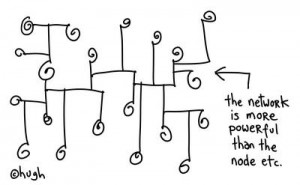A recent blog post, Cooperation vs Collaboration, I read about a couple of weeks ago has been stuck in my head and I keep coming back to it and re-reading from the school librarian perspective. Of course coming from the school library world I instantly thought of Loertscher’s Taxonomies of the School Library Media Program (2000).
This post gives what I consider to be an up to date viewpoint on cooperation and collaboration:
“When collaborating, people work together (co-labor) on a single shared goal. Like an orchestra which follows a script everyone has agreed upon and each musician plays their part not for its own sake but to help make something bigger.
When cooperating, people perform together (co-operate) while working on selfish yet common goals. The logic here is If you help me I’ll help you” and it allows for the spontaneous kind of participation that fuels peer-to-peer systems and distributed networks. If an orchestra is the sound of collaboration, then a drum circle is the sound of cooperation.”
The rest of the post goes on to talk about differences in the two and how they can be thought of in the context of today’s world – very interesting reading! As I read I was reminded of my own research and distributed leadership. Distributed leadership places an emphasis upon maximizing expertise of teachers and building capacity within the organization (Spillane, Diamond, Burch, Hallett, Jita, & Zoltners, 2002). Distributed leadership can provide leadership that is “fluid and emergent, rather than a fixed phenomenon” (Gronn, 2000, p. 324), where teachers can become leaders at various times and work collaboratively to pool their expertise, vertically and laterally (Muijs & Harris, 2007). This type of leadership is particularly appropriate for school librarians due to their knowledge of pedagogical principles, their global perspective on the school curriculum, their training as information experts, and their experience in collaborating with classroom teachers. School librarians have this unique expertise to contribute.
So indeed the school librarian is there to play a part and through their strengths contribute to the bigger goal of academic achievement. But from experience I also know that there is this spontaneous participation that comes with being a school librarian and indeed we “perform” together with teachers while working on common goals with teachers, but we are also working on our goals focusing on creating information literate students.
This post goes on to further talk about the shift to connectives and connectivism, which I think definitely relates to school librarians and I teach in my courses. “Connectives cooperate. A connective doesn’t give priority to the group or the individual but instead supports and encourages both simultaneously… By linking selfish yet common acts together, connectives are able to empower individuals while creating new kinds of group value.” Using the example of Delicious and individual bookmarks here really brings home the point that connectives “support individuals while encouraging the emergence of new kinds of group value.”
Thoughts from this blog post such as “But today, cooperation is fueling most of the disruptive innovations of our time. In virtually every aspect of our culture, the old guard is being replaced by cooperative, self organizing, distributed systems” make me wonder if it is time that we as school librarians thought about our roles in this context.
Perhaps it is time for a change in our thinking – away from the old taxonomies, definitions, and terminology- to taking a new up dated look at what practice looks like in today’s school libraries.
References
Cloudhead. (2014, June 2). Cooperation vs collaboration [Web log post]. Retrieved from http://cloudhead.headmine.net/post/3279118157/cooperation-vs-collaboration
Gronn, P. (2000). Distributed properties: A new architecture for leadership. Educational Management & Administration, 28(3), 317-38.
Johnston, M. P. (2012). School librarians as technology integration leaders: Enablers and barriers to leadership enactment. School Library Research, 15(1). Retrieved from www.ala.org/aasl/slr
Loertscher, D. V. (2000). Taxonomies of the School Library Media Program (2nd ed.). Clearfield, UT: LMC Source.
Muijs, D., & Harris, A. (2007). Teacher leadership in (in)action: Three cases studies of contrasting schools. Educational Management Administration & Leadership, 35(1), 111-134.
Spillane, J. P., Diamond, J. B., Burch, P., Hallett, T., Jita, L., & Zoltners, J. (2002). Managing in the middle: School leaders and the enactment of accountability policy. Educational Policy, 16(5), 731-762.


Yes, that’s a useful piece on Cooperation vs Collaboration. When I looked for it again recently, the site seemed to be down (fortunately, I saved a copy). Not surprisingly, Stephen Downes thought it was a very clear and helpful explanation (it was his Online Daily email that drew my attention to it). Your comments about distributed leadership are very true. The change from Me to We requires more than just the flipping of one letter — it means turning traditional organisational culture on its head. Institutional as well as individual transformation will be necessary. Although not impossible, this is a formidable challenge.
Cheers.
Mark McGuire
Blog: http://markmcguire.net/
Twitter: @mark_mcguire
Yes, that’s a useful piece on Cooperation vs Collaboration. When I looked for it again recently, the site seemed to be down (fortunately, I saved a copy). Not surprisingly, Stephen Downes thought it was a very clear and helpful explanation (it was his Online Daily email that drew my attention to it). Your comments about distributed leadership are very true. The change from Me to We requires more than just the flipping of one letter — it means turning traditional organisational culture on its head. Institutional as well as individual transformation will be necessary. Although not impossible, this is a formidable challenge.
Cheers.
Mark McGuire
Blog: http://markmcguire.net/
Twitter: @mark_mcguire